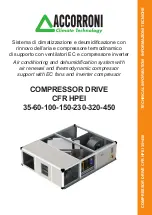
18
Part # 25000102
Installation and Operations Manual
Refrigerant Distribution
The distribution system is selected based upon the type of
defrost for that particular system. For each set of liquid/suction
lines a distribution system must be selected.
Liquid solenoids are recommended to be installed at the
evaporator on all systems, particularly systems with long
line runs. The solenoid will prevent continued feed to the
evaporator through the expansion valve when it is not in
operation. A solenoid is mentioned in each of the refrigerant
distribution analysis, and are shipped loose to be installed at
the evaporators.
Heatcraft offers three types of defrost: Off cycle defrost, Electric
defrost and the Priority I hot gas defrost system for Racks. The
type of defrost is generally a matter of either contractor or
owner preference. Typical operation is as follows:
Off-Cycle
The
off-cycle
system consists of liquid and suction line ball
valves for circuit isolation, liquid solenoid and defrost controller.
Defrost is initiated by the controller. The liquid solenoid closes
pumping down the circuit, the evaporator fans remain in
operation and room air melts the ice on the coil. The controller
terminates the defrost period after a predetermined time
period and opens the liquid solenoid putting the system back
into refrigeration.
Electric Defrost
The
electric
defrost system consists of liquid and suction line
ball valves for circuit isolation, liquid solenoid, evaporator heater
contactor, heater fusing, evaporator fan motor contactor and
fuses if three phase fans are used, and defrost controller.
Defrost is initiated by the controller. The liquid solenoid closes,
the evaporator fan contactor opens stopping the fans, and the
defrost heater contactor is energized.
When the defrost heaters warm the coil to a predetermined level
an adjustable defrost termination device within the evaporator
signals the defrost controller to end the defrost period. A fan
delay is provided at the end of each defrost cycle to allow the
evaporator to cool before the fans start. This also prevents
warm air and condensation from being discharged from the
unit. The liquid solenoid opens putting the system back into
refrigeration.
Priority I Hot Gas Defrost
For Racks Only
The
Priority I
Hot Gas Defrost
system consists of liquid and
suction line ball valves for circuit isolation, liquid line solenoid
with by pass check valve, suction solenoid valve, hot gas
solenoid valve, liquid drain solenoid valve, liquid drain manifold,
and defrost controller.
Defrost is initiated by the defrost controller closing the liquid
solenoid and suction solenoid. The hot gas and liquid drain
solenoids open (Unlike typical systems wherein the condensed
liquid from the defrosting evaporator is returned into the
liquid manifold, the Priority I design returns the liquid to the
condenser through a liquid drain manifold).
Hot discharge gas is injected into the suction line at the
parallel rack and flows to the evaporator being defrosted. The
discharge gas will condense into liquid as it flows through the
cold evaporator.
The liquid exits the coil at the distributor side-port, then flows
through the liquid line by pass check valve into the drain
manifold and then returned to the condenser inlet.
The pressure in the condenser is controlled to be below the
returning liquid pressure by a discharge gas regulator valve. The
returning liquid pressure helps in driving refrigerate from the
condenser to the receiver to maintain liquid refrigerant flows to
the refrigerating evaporators. The Priority I system requires that
no more than 20% of the evaporators defrost at one time.
The discharge gas regulator valve (DDGR) is normally set to
maintain approximately 25 psig differential pressure. The
next part of the Priority I system consists of a small capacity
control system located at the compressor rack. The discharge
gas bypass regulator valve should be set to maintain the
normal suction pressure during normal refrigeration. There
is a desuperheating TXV mounted to prevent overheating
the suction line. The expansion valve should not require an
adjustment as it is preset to maintain 20°F superheat. See page
31 of this manual for more information on the adjustment of
the discharge gas bypass regulator valve.
Head Pressure Control System
Almost all refrigeration systems require some form of year
round head pressure control. This is due to the fixed amount
of condenser surface which has been selected for summer
conditions. During the winter, the condenser is oversized for
the system and low head pressure will result. This will cause
erratic operation of the system.
The following method of head pressure control is considered
the most effective means and has the advantage of performing
well at low outside ambient temperatures. The disadvantage is
the fact that a relatively large quantity refrigerant must be used
to flood the condenser and sufficient receiver storage must be
provided during summer operation.
Head pressure control system
consists of a condenser drain
line valve and a discharge bypass valve. In order to maintain
moderate head pressure the condenser drain valve senses
condensing pressure. As condensing pressure falls in response
to lower ambient temperatures, the drain valve will begin to
restrict flow of liquid from the condenser filling condenser
tubes with liquid refrigerant. This results in decreased surface
area causing the discharge pressure to rise.
When pressure reaches the midpoint setting the valve begins to
open allowing liquid to flow to the receiver. Simultaneously the
discharge bypass valve installed in a line between the discharge
manifold and the receiver maintains minimum receiver pressure
to insure liquid flow.
















































